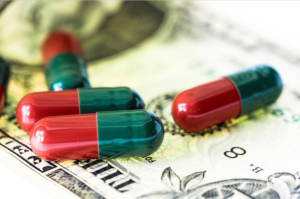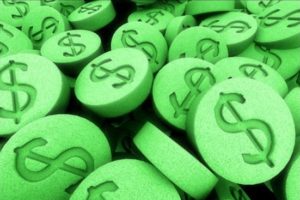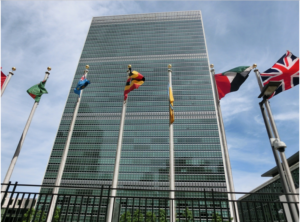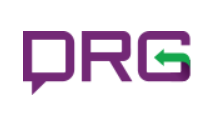- The drug industry wins pricing battle in California, likely to fare better with Trump (mmm-online.com)
The defeat of a ballot measure in California that sought to set limits on drug prices as well as the election of Donald Trump are expected to lessen the pressure on drug pricing that pharmaceutical companies had anticipated...The pharmaceutical industry aggressively opposed the California ballot measure, which was backed by groups like the AIDS Healthcare Foundation and AARP...the two sides had spent a combined $115 million on campaigns, with $106 million of that coming from pharma and industry groups...The defeat of Proposition 61 in California reaffirmed the power of the biopharma lobby... the prospect of a Republican-led White House and Congress doesn't mean that the pricing debate will fade away. Owing to the continued furor...
- Drugmakers’ Pricing Power Remains Strong (wsj.com)
Pharmaceutical companies’ power to raise prices is firmly intact despite pushback from health insurers, scrutiny by U.S. lawmakers and anxiety about rising prescription drug spending...More than two-thirds of the 20 largestpharmaceutical companies said price increases boosted sales of some or most of their biggest products in the first quarter...Shares of many drugmakers have slumped this year, partly because of investors’ concerns that Congress could implement new price controls, or that public scrutiny would cause companies to voluntarily ease price increases...The upshot is that in a period of low inflation and sluggish economic growth, drugmakers’ power to raise prices still exceeds most other industries. And though it’s long been common for companies to gradually raise prices on drugs after launching them, the magnitude and frequency of the increases have grown in recent years...
- Most Americans would avoid clinical trials due to worries over safety and costs (statnews.com)
Most Americans would not enroll in clinical trials over concerns they would experience side effects, encounter higher costs, or receive a placebo instead of an actual medicine, according to a new survey...only 35 percent say they were likely to participate in a study and, overall, just 40 percent have a positive view of clinical trials, according to the survey...conducted by the Memorial Sloan Kettering Cancer Center...The results underscore the difficulties that confront policy makers, pharmaceutical companies, and health care providers as they seek to develop and deliver new treatments. And if this sort of reluctance to participate in trials continues, there is concern there will be a research and discovery "crisis,"...clinical trials are the engine that drives innovation...This is a critical element in the process...We have so many new agents and opportunities to improve outcomes. But if we don’t enroll people in clinical trials, we will not realize the benefits...
- Insurers, drugmakers wrestle with how to build value-based contracts (modernhealthcare.com)
...outcry over drug pricing has forced healthinsurers and pharmaceutical companies to devise ways of expanding access to potentially life-saving drugs without breaking the bank...Value-basedcontracts, in which insurers pay for drugs based on their effectiveness, have begun to sprout, and more are expected to follow. But experts believe these types of deals, although potentially beneficial, are not a panacea for managing drug costs. Value-based contracts may also be hard to orchestrate since they require doctors, insurers, pharmacy benefit managers and drug companies, often rivals, to cooperate and share data...What you still don't know at the end of the day with these outcomes agreements is whether they save money…Paying for the efficacy of drugs is a logical extension of how the U.S. wants to finance healthcare. Medicare rewards hospitals that deliver good care and penalizes those with high levels of costly readmissions. Private insurers have created narrow networks with selected health systems and doctors presumably based on their low costs and superior quality...most difficult hurdle may come once insurers, PBMs and drug companies have agreed on measurable, clinically relevant metrics. Those groups then have to share their medical and pharmacy data to track outcomes, which requires a high level of cooperation from fierce, often unfriendly negotiators...
- Drugmakers agree to clean up plants, take other steps to fight antibiotic resistance (fiercepharma.com)Industry Roadmap for Progress on Combating Antimicrobial Resistance – September 2016 (ifpma.org)
More than a dozen pharmaceutical companies from Big Pharma players to CMOs have agreed to take steps to fight antibiotic resistance, including reviewing their manufacturing and supply chains and working on standards for cleaning up antibiotic waste discharge...The agreement was announced this week as part of a United Nations meeting...where antibiotic resistance was said to be one of the pressing issues facing the world. It is a pharma specific follow-up to the broader Davos Declaration signed by about 100 companies during meetings early this year...Three other steps the 13 drug companies agreed to take are to help ensure antibiotics are used only by patients who need them; to improve access to current and future antibiotics, vaccines, and diagnostics while working to reduce the prevalence of substandard and counterfeit antibiotics in high-risk markets; and to look for places to cooperate in developing new antibiotics…Though the commitment may be there, history has shown this to be a tough issue with which to deal...
- Drug salesmen arrested for paying doctors to prescribe fentanyl (usatoday.com)
The arrests of two former pharmaceutical salesmen for allegedly paying doctors to prescribe fentanyl... drew a strong reaction from law enforcement and other doctors, who note that pharmaceutical companies have aggressively marketed risky and addictive painkillers in recent years and have paid more than $1 billion to settle charges of illegal marketing...The two salesmen...worked for...Insys Therapeutics, whose only approved product, Subsys, is a fast-acting form of fentanyl sprayed under the tongue...While fentanyl patches provide a slow, continuous dose of painkiller, spraying Subsys under the tongue provides relief in as little as five minutes...The salesmen paid two New York-area physicians a total of $259,000 in kickbacks in 2014... doctors wrote a total of more than $6 million in Subsys prescriptions in 2014...An Insys manager allegedly knew of the scheme and instructed sales staff to demand that the doctors prescribe "large quantities of fentanyl" in exchange for the money...The alleged kickback scheme is "one of the reasons we’re experiencing an epidemic of overdoses and deaths in this country," said Diego Rodriguez, an FBI assistant director...
- Prescription drug roundup is today 10AM-2PM (kolotv.com)
On April 30th, 2016, local and federal agencies will once again partner together to sponsor the Prescription Drug Round Up event in Washoe County. Since the area’s first event in the fall of 2009, the Round Ups in Washoe County have collected over 1.6 million prescription pills. More than 230,000 of those pills were in categories that are commonly diverted and abused, such as painkillers, depressants and stimulants...Medications – including household prescription and over the counter pills and liquids – can be dropped off at the Round Up event with no questions asked. Citizens are asked to bring medications in their original containers if possible, and may mark out the patient’s name if they wish. Prescription waste or expired/surplus medications from medical offices or pharmaceutical companies or their representatives are not accepted at this event. In addition, volunteers from Northern Nevada HOPES and the Northern Nevada Outreach Team will be collecting residential sharps and providing information to the community about proper syringe disposal...Round Up Locations April 30th 10:00am – 2:00pm:
- Raleys - 18144 Wedge Parkway, Reno
- Walgreens - 10370 N. McCarran Blvd, Reno
- Save Mart– 4995 Kietzke Lane, Reno
- CVS - 680 N. McCarran Blvd, Sparks
- CVS – 5151 Sparks Blvd, Sparks
- Walmart – 250 Vista Knoll Parkway, Reno
- Incline Village Community Hospital – 880 Alder Ave, Incline Village
- Report: 3 tips for pharma to provide beyond-the-pill services (mmm-online.com)
Physicians expect pharmaceutical companies to provide more beyond-the-pill services, as they face increasing pressure from empowered patients as well as accountable care organizations and integrated delivery networks...The report...found that 46% of the physicians it surveyed expect drugmakers to provide beyond-the-pill services, and 34% have used a beyond-the-pill service from a pharma company...Here are three key insights for pharma marketers to take note of:
- Drugmakers should provide more than just product information on their websites.
- Physicians are more likely to prescribe a product if it comes with beyond-the-pill services.
- Sales reps should be leveraged to engage physicians.
- NGO questions drug industry backing of G7 antibiotic preservation pledge (in-pharmatechnologist.com)
Industry backing for a G7 plan to preserve antibiotics is at odds with current marketing practices says an NGO calling for a clamp down on campaigns that promote overuse...This week a pledge by G7 leaders to address 'market failures' that discourage antibiotic R&D and encourage over promotion won the support of the Association of the British Pharmaceutical Industry...The ABPI welcomed the ・commitment for collaborative global action by the G7 on tackling the unique medical, scientific and economic challenges presented by antimicrobial resistance・ telling us antibiotic stewardship was a core focus of the industry declaration launched at World Economic Forum meeting in Davos...industry support for efforts to preserve antibiotics is disingenuous according to Gemma Buckland Merrett, senior research Manager at NGO Health Action International, who suggested current marketing practices are part of the problem..."Evidence is starting to show that increased marketing of antibiotics by the pharmaceutical industry may be exacerbating inappropriate antibiotic use" Merrett told us...Despite the risks of resistance, pharmaceutical companies have continued to market antibiotics, often incentivising medical and veterinary personnel to overuse or inappropriately prescribe antibiotics.
- Drug makers paid fewer fines for bad behavior in recent years (statnews.com)
After a decade in which drug makers regularly paid huge fines for various fraudulent practices, there was a noticeable drop over the past two years, according to a new analysis by Public Citizen...Pharmaceutical companies paid approximately $2.8 billion to settle federal and state civil and criminal charges in 2014 and 2015, compared with $9.9 billion during 2012 and 2013. The most recent payments also amounted to the lowest two-year total since 2004 and 2005...Among the worst offenders in recent years were Johnson & Johnson, Pfizer, Novartis, and GlaxoSmithKline, although the report noted that nearly every large drug maker has paid fines to resolve some kind of infraction over the past two decades...A spokesman for the Pharmaceutical Research and Manufacturers of America...We are disappointed at the report’s misleading conclusions...Among its many methodological flaws, the report aggregates all settlements involving the pharmaceutical industry, with little regard as to whether the companies actually broke the law. Civil settlements rarely resolve the question of guilt. Yet the report glosses over its own finding that 88 percent of the settlements reported were civil, not criminal...








